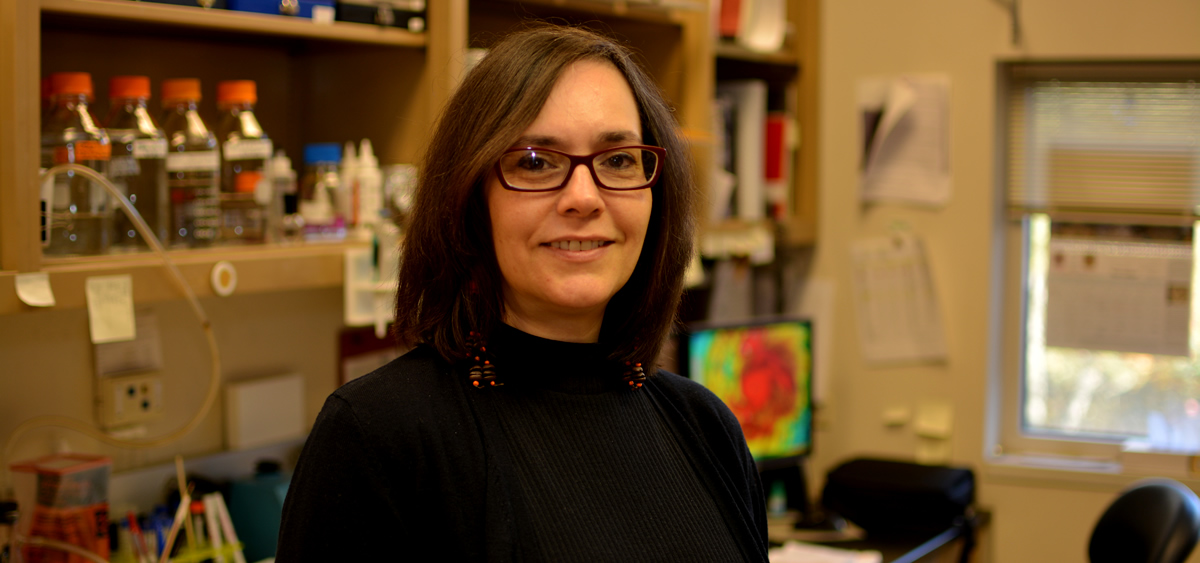
PHILADELPHIA (January 8, 2019) — Pancreatic ductal adenocarcinoma (PDAC) is on track to become the second most lethal cancer in the U.S. by 2020, but Fox Chase Cancer Center researchers are exploring the structural mechanisms that allow these cancer cells to spread, and a new paper suggests that altering underlying substrates could harness the body’s ability to restrict the disease’s progress.
The study, entitled, “Rigidity controls human desmoplastic matrix anisotropy to enable pancreatic cancer cell spread via extracellular signal-regulated kinase 2,” was led by Edna Cukierman, PhD, associate professor at Fox Chase Cancer Center and co-leader of the Center’s Marvin & Concetta Greenberg Pancreatic Cancer Institute. Peter I. Lelkes, PhD, the Inaugural Director of the Institute for Regenerative Medicine and Engineering at the Lewis Katz School of Medicine at Temple University, collaborated. The paper appeared in the November 2018 edition of the journal Matrix Biology.
PDAC includes desmoplasia, fibrous-like stroma (supportive connective tissue and blood vessels), which encompasses most of the tumor mass. Desmoplasia is produced by cancer-associated fibroblasts (CAFs) and includes their cell-derived extracellular matrices (CDMs). Elimination of desmoplasia has proven detrimental to patients so Cukierman and her colleagues hypothesized that reprogramming CDMs instead of destroying them could be therapeutically advantageous.
“Data from this study suggest that the architecture of CDMs, and not necessarily matrix stiffness, could be manipulated to render a tumor-suppressive microenvironment,” Cukierman wrote. “Hence, treatments that could reprogram desmoplasia to become tumor-suppressive/restrictive or that could target tumoral ERK2 might provide new means for treating PDAC patients in the future.”
Pancreatic cancer relies on a protein called extracellular signal-regulated kinase 2 (ERK2) to spread. In the study, Cukierman biomechanically manipulated CDMs to reduce nuclear translocation of phosphorylated ERK1/2 (pERK1/2) proteins in PDAC patients with the KRAS gene mutation (KRAS-driven PDAC). In vitro findings were validated in vivo, where nuclear pERK1/2 was found significantly higher in human PDAC samples as compared with those from a normal pancreas. The study suggests that altering underlying substrates enables CAFs to remodel CDMs and restricts KRAS-driven PDAC invasion in an ERK2 dependent manner.
Research highlights from the study included the following:
- Substrate stiffness dictates a biphasic distribution of fibroblastic aspect ratios, which dictate extracellular matrix fiber alignment
- Biphasic matrix fiber alignment is explained by a minimum free energy model
- Physiologically soft substrates prompt formation of an isotropic matrix that restricts tumor cell growth and spheroid cell spread via nuclear pERK1/2 exclusion
- Anisotropic matrix-induced pancreatic cancer cell spread is regulated by pERK2
- Human normal stroma maintains pERK1/2 out of the nucleus of pancreatic epithelium
Funding was provided by research grants from the Commonwealth of Pennsylvania, Temple-FCCC’s Nodal Grant, funds from the Martin and Concetta Greenberg Pancreatic Cancer Institute (EC), and National Institutes of Health/National Cancer Institute’s core grant supported facilities: Talbot Library, Biorepository, Translational, Histopathology, Biostatistics, Cell Imaging, Cell Culture, Instrument Shop and Glass Washing.